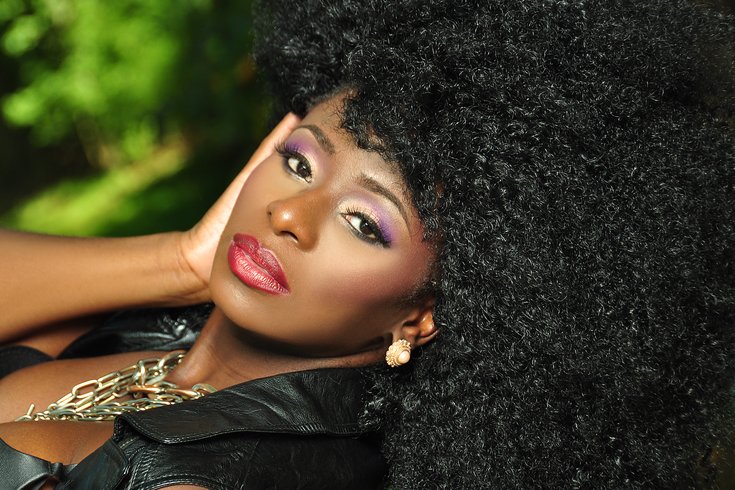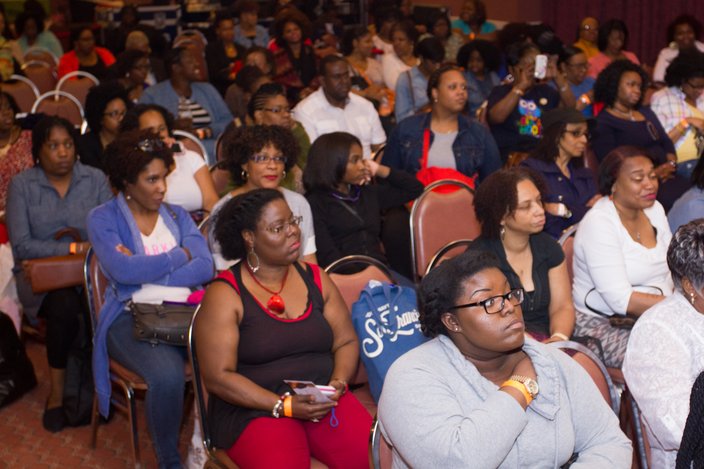
May 12, 2016
 James Louis III/Mushiya Tshikuka
James Louis III/Mushiya Tshikuka
Mushiya Tshikuka will be a headliner at the 2016 Philadelphia Natural Hair Show. Tshikuka stars in the WE TV reality show 'Cutting it in the ATL.'
Black haircare sales accounted for $2.7 billion of the haircare industry in 2015, according to market research agency Mintel, with that figure slated to improve by 26 percent between now and 2020. Recognizing the need for women to better understand their natural hair in the midst of this growth, Celena McAfee and Monique Eversley are hosting the fourth annual Philadelphia Natural Hair Show on Saturday. The event is intended to educate and empower women through workshops and a series of performances that culminate in a fashion show.
Here, this year's headliner, "Cutting It in the ATL" personality and The Damn Salon natural hair stylist Mushiya Tshikuka, talks common hair complaints, haircare during the summer months and what to expect from her salon's performance at the Natural Hair Show.
For someone who is a blank slate on this subject, how would you define natural hair?
I would describe natural hair as the kinky, curly texture that grows from a black woman’s hair. And for years, women have not worn their natural hair because their idea of beauty came in straight hair. So now women are beginning to embrace their natural textures, and I’ve created looks from years ago that make natural sexy, make it corporate and make women want to love and embrace their natural hair.
What do you think is behind that shift toward fewer people straightening their hair?
I think it’s directly associated with creating looks and styles that made women feel comfortable wearing their natural, kinky hair. It’s the innovation of styles that made women say ‘I want that big hair.’ But actually, it's more ‘I have that big hair — I just need to stop straightening my own.’
A scene from the 2015 Philadelphia Natural Hair Show.
In styling natural hair right now, what is the big shift in terms of style products?
The trend right now is curls, curls and more curls. Texture. Big hair. So, everybody wants their hair as big as possible. And at this point now if your natural hair is not big enough, there are extensions — for example, my RunwayCurls extensions, they're kinky hair extensions that actually elongate our natural curly texture, seamlessly. Before — if you’re a guy you might not know — but people were wearing these extensions for a long time, but only straight extensions existed. So black women would wear only straight extensions. But now, with RunwayCurls, a kinky, curly hair line, women can wear hair extensions that actually look like their big, kinky, wildest hair.
What’s the biggest complaint you hear from customers, in trying to maintain their natural hair?
Well, it’s two things: One of the biggest complaints is ‘My hair doesn’t grow.’ A lot of black women say that. But what happens, is they don’t know how to maintain it well; all hair always grows, and it’s not that their hair is not growing. It’s just breaking faster than it’s growing. Why is it breaking faster? It's probably because of what you’re doing to it.
A lot of women, they can be 35, or 45 or 55 — they don’t know how to comb their natural hair. Because for years, they have not seen or dealt with their natural hair, because at 11 their mother permed their natural hair. So if you’ve been dealing with straight hair for years, and you've been playing with dolls that have straight hair for years, when you finally decide to go natural you don’t even know how to comb kinky hair. You’re like, ‘The comb is not going through!’ That’s because you’re not actually putting the comb in the right place. Simple things like this they don’t know.
So, a lot of complaints are their hair don’t grow, their hair is breaking, they have no edges — and a lot of women have a bald area in the middle of their head and they say it’s hereditary. But generally, it’s not hereditary. The only hereditary thing is their mother didn’t know how to take care of their own hair too. So it’s important to be educated in dealing with this hair because these people really don’t know how. But I have a solution for that [coming soon for kids].
Why do you think so few mainstream ads gear toward natural hair? If you’re watching a commercial, it’s still 'standard,' straight brown or blonde hair you typically see in a shampoo commercial.
I’ll tell you what. Initially, these big companies defined the norm, defined the beauty. You follow? So also, back in the day, the only huge platform of influence were things such as TV and radio. And ‘regular people,’ for lack of a better word, were not always on TV and radio. So very few people could have the platform to define what is normal. But now with social media, the world is so small — a little person in a little corner of a little building can [have a lot of influence]. That person in the corner who decided, or that little girl in her little closet, who came out and decided ‘I’m going to wear natural hair and show everybody it’s the most gorgeous thing. And everybody else is going to wear it.' She doesn’t need television; she doesn’t need radio. All she needs to do is get on her computer and show the world. Take some pictures and show the world ‘This right here is the ----.’ And bam, the world is influenced. [Laughs]
When it comes to natural hair, for us, it’s a lifestyle. A movement. It’s more than just hair. We live and breathe the philosophy and mentality that we are absolutely stunning in our kinky, curly textured hair, and that it’s not necessarily about the hair — it’s about the confidence.
Why do so many salons stick to cuts and colors? So many full-service salons don't really advertise themselves as a destination for natural hair.
The foremost thing that comes to my head, is the general population, 92 percent of the world, are followers. Followers meet the demand. The rest of the 8 percent are leaders and create the demand. I’m a demand creator. I don’t have to just meet a particular demand; I can create a demand for something. This is to say that most salons service cuts and color because they know they’re comfortable — it’s a demand they know exists. A lot of them are afraid to service that hair because 1) They don’t know it, and 2) They don’t know if they’ll survive financially.
You have a performance in collaboration with your salon called 'Who the Hell Says Natural Hair Has to be Boring?' in this year's show. What can people anticipate from that?
When it comes to natural hair, for us, it’s a lifestyle. A movement. It’s more than just hair. We live and breathe the philosophy and mentality that we are absolutely stunning in our kinky, curly textured hair and that it’s not necessarily about the hair — it’s about the confidence. We capture people and display that through music, through hair, through fashion, a lot of things ...
Basically, when we do a stage presentation, we incorporate music, fashion, hair. On the stage we’ll have our DJ; we’re going to have our songs, producers on the team, everything we walk through and talk about is basically our music, and we’re going to have a live band on the stage with some stunning models rocking their own natural hair — as well as [models with] hair extensions. Everything will be displayed in a very dynamic presentation.
Any advice for black women maintaining their hair during the summer?
Yes, most definitely. Summer there’s heat and with natural hair it’s very different than with permed or straight hair, moisture is the most important thing when it comes to growing natural hair. My advice to women is just to wash their hair as often as possible. The rule of thumb back in the day for black women was to wash your hair as little as possible because it is just better for your hair, but that's not true. That’s definitely my No. 1 advice. My No. 2 is that, with your natural hair, it’s not always even about your hair. It’s about your confidence. People will believe in you as much as you believe in yourself. While a lot of women feel like they cannot wear natural hair in corporate America, because they work in a bank or attorney's office, that’s not true. People don’t care unless you care. People don’t make it a big deal unless you do. My advice to women is just to embrace who you are, believe in who you are, walk like you're the ----,and everybody else will think that you’re the ----.
What do you hope people take away from the hair show?
What I want to do whenever I get on the stage is give that woman who is dabbling on the edge of going natural, and loving what she sees, but too afraid to do it, what I hope she'll take away is ‘Wait a minute, I can do that too. I can be just as beautiful and confident too. Screw it. I'm gonna do it.’ And it’s much healthier as well, besides being more beautiful. There are so many problems that come with the chemicals that black women put int their hair on a bi-weekly or tri-weekly basis. With that chemical in their body. So I want them to get away with 'I can do this and be bad*** and it doesn’t matter what the world says.’
 Handout Art/Philadelphia Natural Hair Show
Handout Art/Philadelphia Natural Hair Show